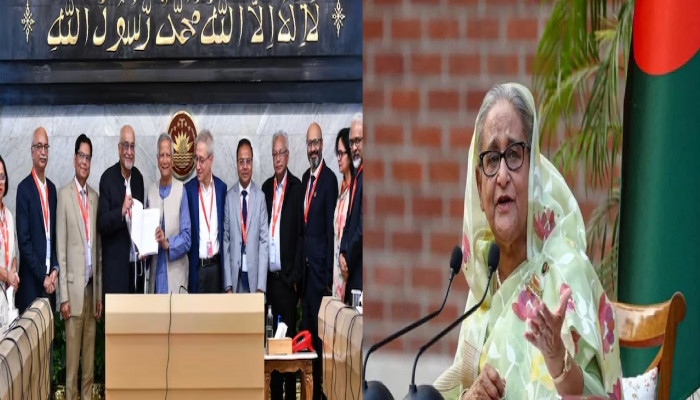$234 billion siphoned off by Hasina regime some routed to and through India: Interim regime
- In Reports
- 04:59 PM, Dec 02, 2024
- Myind Staff
A white paper submitted to Bangladesh's caretaker government claims that $234 billion was taken out of the country during the tenure of former Prime Minister Sheikh Hasina, with some of the money allegedly transferred to or through India.
The government of Muhammad Yunus is thought to have attempted to demonstrate in the white paper that it inherited a broken economy. Yunus stated, "It will show us the economy we inherited after the July-August mass uprising," as he accepted the report from Debapriya Bhattacharya, the chairman of the committee tasked with evaluating Bangladesh's economic situation. Yunus was shown the white paper, and the contents were covered by several Bangladeshi media sources on Monday. The 'White Paper on State of Bangladesh Economy' will be accessible to the public on Monday, December 2.
According to The Daily Star, a white paper revealed that $234 billion was laundered between 2009 and 2023, during the tenure of the Hasina-led Awami League government. The funds were routed through or sent to India, the UAE, the UK, Canada, the US, Hong Kong, Malaysia, Singapore, and various tax havens. According to sources on the white paper committee, up to $24 billion of the $60 billion spent on the Annual Development Programme and other development initiatives under the Hasina administration "has been lost to political extortion, bribery, and inflated budgets," according to The Business Standard, published in Dhaka.
A report in The Business Standard highlighted that infrastructure construction costs in Bangladesh are significantly higher than those in neighbouring countries like India, yet the quality of these projects is lower. This finding comes from a white paper on the economy. The committee responsible for the white paper was formed on August 28 to provide a detailed overview of Bangladesh's economy under the Hasina administration. Opposition leaders have accused this regime of widespread corruption and cronyism. The committee was led by economist Debapriya Bhattacharya, a distinguished fellow at the Dhaka-based think tank, Centre for Policy Dialogue, as reported by The Daily Star. The white paper found that, out of all the industries the committee examined, the banking industry was the most severely affected. Additionally, ten banks were listed as "technically bankrupt and illiquid" by the Dhaka-based Business Standard.
"We chose 10 distressed banks to dig into their solvency and liquidity. Of the 10 banks, two are state-owned banks that were mostly hit by scams in the last decade," it said, quoting parts of the white paper. "The other eight are extremely weak shariah-based banks and conventional private commercial banks." Sheikh Hasina left Bangladesh on August 5 following a month-long protest that claimed hundreds of lives. The unrest began as a student-led movement against government job quotas but soon turned into nationwide demonstrations demanding Hasina step down as Prime Minister. She is now reportedly in a safe house in New Delhi.
After her regime collapsed, Bangladesh faced weeks of chaos, including targeted attacks on minority communities, especially Hindus. A military-backed government led by Yunus is now working to restore order, but students, energised by their protest experience, are acting like paramilitary forces on the streets. Under Hasina's 15-year rule, Bangladesh achieved significant economic growth, particularly through its thriving garment industry, which lifted millions out of poverty. However, her administration and close allies faced accusations of corruption and misusing public funds.







Comments